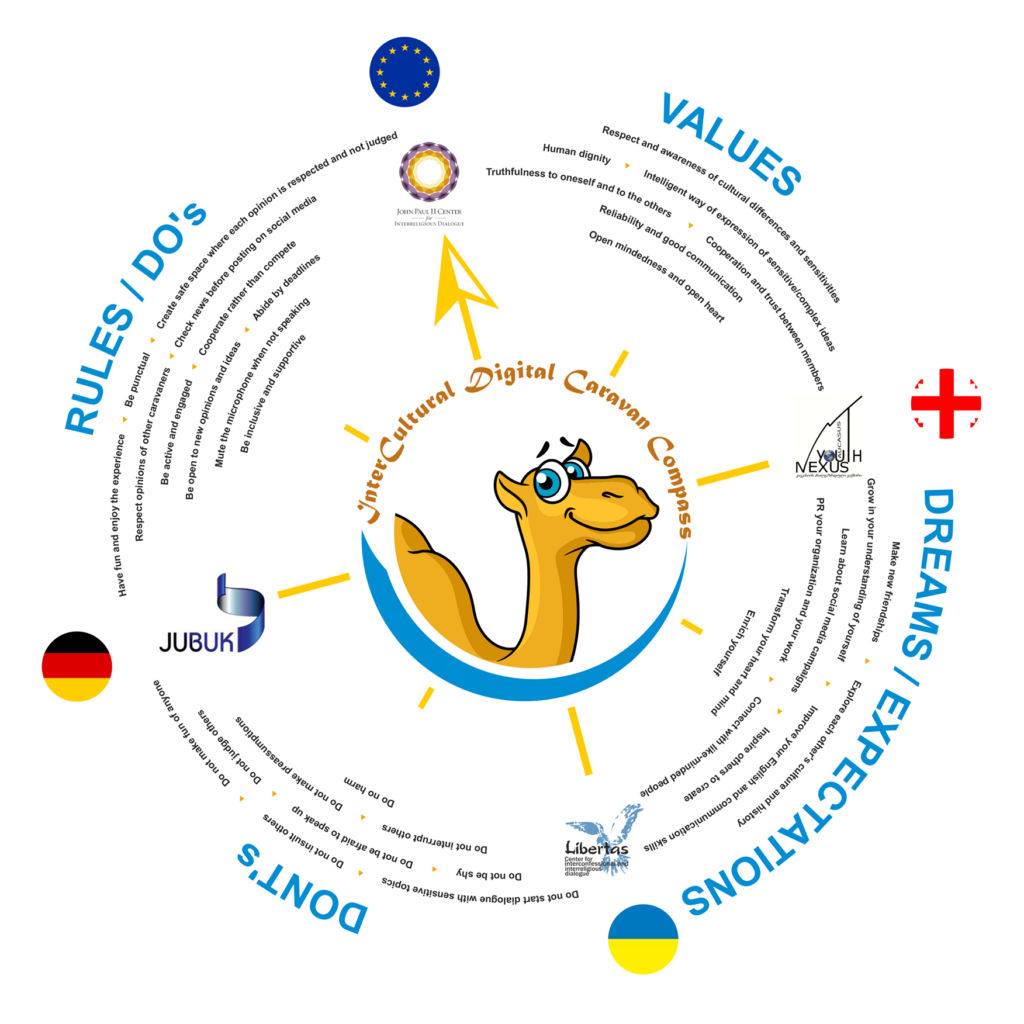Bringing Youth Together to Promote Understanding and Peace Online

In August 2021, the Intercultural Digital Caravan was launched with the support of the John Paul II Center and the EVZ Stiftung. This initiative is a continuation of the Interfaith Digital Caravan that was initiated by the Network of John Paul II Center Leaders in Interreligious Dialogue in June 2020. This project was led by a consortium of the Libertas Center for Interreligious Dialogue / Institute of Religion and Society (Ukraine), JuBuk (Germany), and Caynex (Georgia). Altogether, seven John Paul II Leaders participated in the Caravan project.
Similarly to the Interfaith Digital Caravan, participants of the project met online to share inspiring stories and histories, best practices and expertise in the times of crisis. In this way the organizers hoped to strengthen the spirit of the common good and uplift the virtue of hope in some of the most vulnerable communities.
Initial webinars focused on the networking activities and team spirit of the whole group. The outcomes of such activities were group presentations that aimed at building capacities in creating content and design for starting the Caravan’s media campaign. Participants created the Caravan Compass with rules, expectations and dreams for those who are engaged in dialogue work. Group work also included country presentations by participants.
In a series of online meetings/webinars (five months), thirty participants met inspiring individuals from different cultural and/or religious traditions who hosted talks and presentations, followed by a friendly conversation and dialogue.
Each and every participant has then worked on creating a social media campaign, sometimes in tandem with other participants. The themes of the social media campaigns were related to dialogue, culture, religion, as well as intercultural and interreligious co-existence. In particular, the social media campaigns included the following topics: Mixed marriages; Mental health during pandemic; Identity, stereotypes and prejudices; Essential elements of one’s individual and collective identity; The soft power of intercultural and interreligious dialogue; Resilience and persistence; Empowering Women, etc.
All social media campaigns, information about the project and participants have been compiled into the Caravan website
The current Russell Berrie Fellow from Ukraine, Olena Komisarenko, emphasized the important role religion plays in our societies, “Religion promotes order in society because it seeks to define all aspects of human existence and social ties. Religions have often based their moral and social strength on the belief in the existence of an order that, from biological structure to the order of society, reflects a preterhuman will higher than the personal will of man. The radicalization of religion can lead to violence, followed by political and technical support for violence and, ultimately, terrorism or involvement in armed conflicts around the world.”
Similarly, Vladimer Narsia, Russell Berrie Fellow from Georgia, expressed his view on the role of religion and interfaith dialogue as he shared his personal experience, “The Power of religion is laid in its emphatical spirit. When a religious leader speaks about vulnerability, we believe that he/she takes our pain wholeheartedly. Here I mean that the prototypes of the founders are important to perceive the meaning of a particular religion and accordingly its function.”
JPII Leader from Ukraine, Nadiia Sybira, shares her experience: “The impact of my campaign was mostly seen among the participants themselves – mixed couples and their children – as they were interested in other participants’ testimonies and were asking me to share other stories with them. The outcome of my campaign is that the topic of mixed marriages aroused interest among my colleagues and friends. There were a number of interviews conducted as a result of my campaign which later on can be republished in other networks; there is already a virtual mixed marriages network and these connections can be strengthened through further partnerships like webinars and offline meetings in the future projects.”
The John Paul II Center is honored to support the interreligious and intercultural initiatives of its Leaders!
